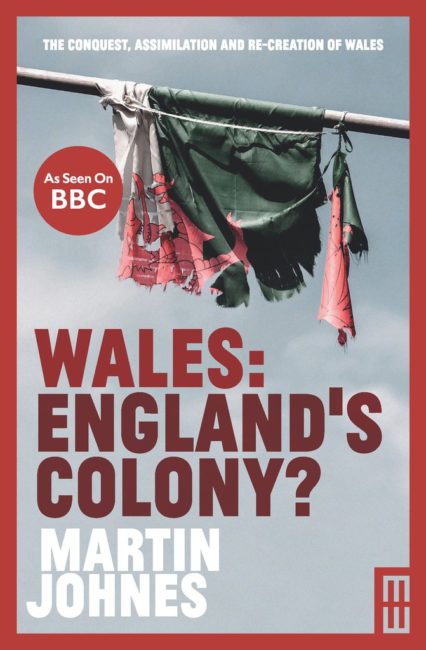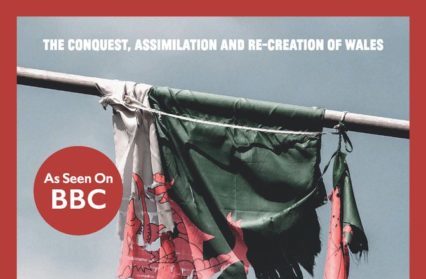Adam Somerset casts a critical eye over Wales: England’s Colony? a new book by Martin Johnes, which has also recently premiered on BBC Two.
Social psychology has long investigated the effects of attribution on behaviour, both from without and the effects of self-attribution. The first definitive study, one of a flood, was published by Leonora Jacobson and Robert Rosenthal in the 1960s. Its conclusion was that educational outcome was affected by educator expectation. To tell a group, from outside, that it is subject to particular conditions of disadvantage is deleterious to the group. Wales: England’s Colony? is a strong book, a crisp and pungent 196 pages, but also an important one. Martin Johnes takes a wrecking ball to the ideology of Wales as historical victim.
 Victimology is pervasive. It is the foundation stone for the dullest art of Wales. Mike Parker in interview with Misha Glenny on Radio 4 in March characterised the economic relationship with England as essentially exploitative and passive. Not so, contests Johnes. Trade was powered, like all trade, by mutuality of interest. The flow of goods occurred “not because the state was extracting what it needed but because the Welsh were looking for places to sell what they had.”
Victimology is pervasive. It is the foundation stone for the dullest art of Wales. Mike Parker in interview with Misha Glenny on Radio 4 in March characterised the economic relationship with England as essentially exploitative and passive. Not so, contests Johnes. Trade was powered, like all trade, by mutuality of interest. The flow of goods occurred “not because the state was extracting what it needed but because the Welsh were looking for places to sell what they had.”
Mike Parker told a radio audience “It is a model extractive economy where you have goods and people whizzed out to the east… To take the raw materials out of Wales, the coal and the iron, as fast as possible, down to the ports, out to the railways, and to the east, that’s been the pattern of development of Wales through the centuries.” But history does not fit the model of the provision of raw material for an expansive power outside. Wales is not the Congo. Processing, copper and lead smelting in Swansea and Neath, goes back centuries. Dowlais and Cyfarftha turned the Valleys from pasture to pollution. Llanelli was the world centre of tin-plating at its peak.
Martin Johnes has form. The Hay Festival has regularly provided a platform for the new generation of historians. Sam Blaxland, a PhD student of Johnes’ and now colleague at Swansea University, is an authority on the history of the Conservative Party in Wales. An audience member at Hay was of the view that the study of 400,000 fellow citizens was an un-Welsh activity in itself. But a historian of the previous generation was clear on the history that Wales deserved. Peter Stead: “Historians are there to put in the complications. Our role is to bring complexity.”
England is of course crucial but, says Johnes, “Welsh history is more complicated than a list of things the ‘nasty’ English did.” Deheubarth, Powys and Gwynedd were separate political identities. A sense of fusion came about by force from without, leading to the paradoxical conclusion:: “Thus, in some ways, it was England that first made Wales.”
The book makes an intriguing contrast with Cumbria, also a Brythonic-speaking western territory, where a sense of identity has evaporated. The view of the effect of conquest on culture is clear:. “Neither Crown nor Barons ever tried to obliterate Welsh identity…Thus, having unintentionally made Wales, England did not intentionally try to unmake it either.”
The arrival of English law in the 13th century came with some benefits. Criminal Welsh law saw theft and even violence as a matter between two parties, English law as a breaking of the peace. Women could not own land under Welsh law, a right that was granted in English law. Law and a new order were of significant advantage to trade.
Easy categorisations of history are there too be tested. “Glyndŵr’s revolt may inspire patriots but it actually inflicted considerable economic misery on his people and nation”. The economy of Wales, in the view of another historian Matthew Stevens, was set back a hundred years. The moves for a statue in Cardiff are a first, a city making honour to a man who burnt it down. But as another historian Madeleine Gray put it, again said on a Hay platform, “We don’t like things that make us uncomfortable.”
There is scope for discomfort here. “The reality,” says the book, “is that there are no clear lessons from the past, only tantalising hints to be plundered and moulded to suit pre-existing political beliefs.” The Tryweryn Wall above Llanrhystud was assaulted and restored once again this winter, but even there the facts are not comfortable. “On Tryweryn, at the first reading of the bill 35 out of 36 Welsh MPs voted against it. By the 3rd reading, the number of Welsh MPs voting against was down to 20. The local council in Bala refused to oppose the flooding, while the county council only did so after a narrow vote.”
The book argues against interpretations that seek out Welsh exceptionalism. It is true that letters from the trenches were subject to censorship. “If Welsh blood is good enough to be spilt on the plains of Flanders the Welsh language is good enough to be written” was a protest from a parent at the blocking of letters from Welsh soldiers. But when Johnes touches on the Rhyfel y Sais Bach – the War of the Little Englishman – he puts it in the context of an England of Peterloo.
The anti-Semitic looting in the Valleys is well-known as are the riots against Irish and Chinese. Less well-know is the public discourse after the race riots in Barry, Cardiff and Swansea. In the court cases and newspaper discussion afterwards, there was talk of the need for segregation and of removing people of colour altogether.
But the thread that runs through Wales: England’s Colony? is unambiguous. A line in the introduction highlights a central dialectic within human self-consciousness: “We are all products of our upbringing and part of the battle of writing history is realising this; another part is trying to overcome it.” But the book rejects the status of victimhood. “As long as we see ourselves as powerless victims of the past, it will be very difficult to stop seeing ourselves as powerless victims in the present and future. Taking control of the future of Wales means that we had power in the past too.”
The Afterword, a brief four pages after the historical chronicle, grapples with the paradox. “History offers Wales everything and nothing.” The “everything” poses the challenge: “Yet should we really bury the past and shy away from its less comfortable implications?”
The book does not land on the challenges of 2109: no Barnett formula, no infrastructure deficiencies, no difficulties of geographical dispersion, or the inheritance in health, the age profile, the rejection of European support. The closing lines instead ring with an existentialist power. Of the Wales of the twenty-first century “its people are free to make their own future and their own decisions. They are free to choose who they want to be, as individuals, as a collective, as a nation.”
Wales: England’s Colony? is available now from Parthian Books.
You might also like…
Mario Basini reviews Merthyr: The Crucible of Modern Wales by Joe England, an engaging historical account of industrial-era Merthyr.
Adam Somerset is a regular contributor to Wales Arts Review.











